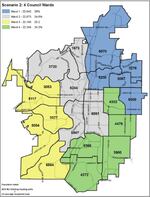A citizen committee in Bend is proposing big changes to how city leaders are elected and paid.
At a city council workshop Wednesday, the group recommended that Bend directly elect its mayor and that the city adopt a geographic ward system for electing some city councilors. The group also favored increasing pay for councilors and the mayor. The committee presented its recommendations to Bend City Council Wednesday night.
Related: Committee Leans Toward Change To How Bend Elects Its Leaders
Bend City Council is expected to vote on some or all of the recommendations by early 2018. But to take effect, the changes would then have to be approved by voters in May, in three separate ballot measures.
In an informal straw poll, all seven councilors indicated that that they’re in favor of a directly elected mayor, but the idea of a ward system and a council pay increase drew more scrutiny.
The city-council appointed committee recommended that the first mayoral election under the new system occur in November 2018, should voters approve the idea of a directly-elected mayor. Right now, the seven city councilors appoint the mayor every two years from among their own ranks.
“You can get into the perception that there’s backroom deals going on,” said committee chair Brent Landels. “Are we really getting the will of the people if it’s the councilors who are appointing their own mayor?”
The committee supported a four-year mayoral term, arguing that it would allow the mayor more time to implement a vision without constant concern for campaign fundraising.
Landels argued that the four-year mayor term would allow the mayor to recruit new businesses or big employers to Bend and to develop statewide relationships with other elected leaders.
Pros And Cons Of A Ward System

This map shows a proposed ward system for electing four of the six members of the Bend City Council.
City of Bend
The 11-person committee unanimously supported the idea of creating wards to elect some city council members, but the idea was met with some pushback from councilors. A ward system would allow for more geographic diversity on the city council. Currently, five of seven councilors live in West Bend, where median incomes and home prices are higher.
The committee recommended that four out of six councilors be elected from newly created geographic wards with 20,000-25,0000 residents per ward. The other two councilors would be elected by city voters at large.
Councilors elected by wards might tend to prioritize their neighborhood’s needs instead of looking out for those of the city as a whole. But they can also allow ward representatives to highlight gaps and needs in parts of the city that might otherwise be overlooked.
Committee members also pointed out that campaigning within a geographic ward can be less expensive than campaigning city-wide. For example, it’s far less expensive to send postcard pamphlets to 20,000 residents versus 80,000 citywide.
“Somebody who was financially limited … would have a better chance at running in a ward,” said committee member Angela Chisum.
Mayor Casey Roats questioned whether there could be value to having candidates with the skill to run a higher profile campaign with more volunteers and potentially more funds.
“Is there something to be said to keeping the bar a little higher overall?” asked Roats.
Committee members said no. They emphasized that ward elections might attract more grassroots candidates. Campaigning across the whole city might be intimidating for some potential candidates.
“It’s a huge obstacle for a lot of people to even think about taking that step,” said Kathleen Meehan Coop.
Some councilors worried that the ward system could lead to “horse trading” as councilors vie for interests in their own part of town.
“It’s a smaller number of people electing someone who represents the whole town, and that concerns me,” said Councilor Nathan Boddie.
Should Councilors Get A Pay Raise?
The committee also favored the idea of paying both the mayor and councilors more than the current $200 per month. (If a councilor puts in 20 hours a week on city work, that amounts to $2.50 an hour.)
Related: Bend's City Council Picks Its Mayor, And Some Councilors Want To Change That
But the group recommended that the exact pay be established later. The first step would be removing the language from the city charter that sets council pay at the $200 level. Next, another independent committee would research and recommend a payment amount, which might be different for the mayor versus councilors. Then the city council would have to vote on that amount by ordinance, to take effect after the next election.
Councilor Nathan Boddie said additional pay might make it possible for some people to run for council who might not otherwise be able to take the time off of work.
But Councilor Bill Mosely rejected the idea.
"I think it’s just a civic duty ... I don’t think we’ll upgrade councilors by paying them $20,000 a year,” Moseley said.
The council would need to act by February if any of these three items are to be on the May ballot.